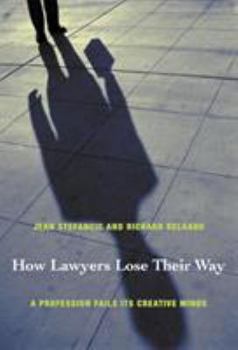How Lawyers Lose Their Way: A Profession Fails Its Creative Minds
Select Format
Select Condition 
Book Overview
In this penetrating book, Jean Stefancic and Richard Delgado use historical investigation and critical analysis to diagnose the cause of the pervasive unhappiness among practicing lawyers. Most previous writers have blamed the high rate of burnout, depression, divorce, and drug and alcohol dependency among these highly paid professionals on the narrow specialization, long hours, and intense pressures of modern legal practice. Stefancic and Delgado argue that these professional demands are only symptoms of a deeper problem: the way lawyers are taught to think and reason. They show how legal education and practice have been rendered arid and dull by formalism, a way of thinking that values precedent and doctrine above all, exalting consistency over ambiguity, rationality over emotion, and rules over social context and narrative. Stefancic and Delgado dramatize the plight of modern lawyers by exploring the unlikely friendship between Archibald MacLeish, who gave up a successful but unsatisfying law career to pursue his literary yearnings, and Ezra Pound. Reading the forty-year correspondence between MacLeish and Pound, Stefancic and Delgado draw lessons about the difficulties of attorneys trapped in worlds that give them power, prestige, and affluence but not personal satisfaction, much less creative fulfillment. Long after Pound had embraced fascism, descended into lunacy, and been institutionalized, MacLeish took up his old mentor's cause, turning his own lack of fulfillment with the law into a meaningful crusade and ultimately securing Pound's release from St. Elizabeths Hospital. Drawing on MacLeish's story, Stefancic and Delgado contend that literature, public interest work, and critical legal theory offer tools to contemporary attorneys for finding meaning and overcoming professional dissatisfaction.
Format:Paperback
Language:English
ISBN:0822335638
ISBN13:9780822335634
Release Date:January 2005
Publisher:Duke University Press
Length:152 Pages
Weight:0.50 lbs.
Dimensions:0.4" x 6.5" x 9.0"
Related Subjects
LawCustomer Reviews
1 rating
Formalism and the Law
Published by Thriftbooks.com User , 16 years ago
It is interesting that there is only one review posted for this book (as of March 2008). You may surmise that busy lawyers just don't have the time for reading this kind of book. You would be right. That is a shame. The legal profession is jam packed with disenchanted/lost souls who made a pact with the devil early in their careers. The trade? A life perversely ruled by "formalism" in exchange for the material rewards of professional success. Those who have a hard time dealing with it later in their careers often realize that they have made a bad trade. They have sacrificed meaning in their endeavors, stifled inner creativity and anesthetized their own humanity. I am not suggesting that all lawyers are inhuman. But the life of a lawyer is typically dull, intellectually sterile, repetitive, unappreciated and not very rich in terms of its humanity. Others have written about this professional malaise. However, the authors of this book put forth a thoughtful analysis of the intellectual underpinnings of the predicament of modern homolexicus. The legal profession is a left lobe dominated pursuit. There are many left lobe dominated pursuits. However, what makes law unique is the disproportionate amount of right lobe thinking humanities types who chose the law with lofty idealism or, in many instances, for want of a more compelling career alternative. The intellectual allure of the law turns into a very different reality in very short order. Bottom line: Understanding your predicament is the first step towards finding a strategy for change. I recommend this book to all lawyers, not as a elixir, but as a catalyst for personal empowerment





